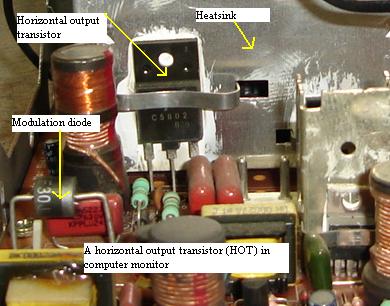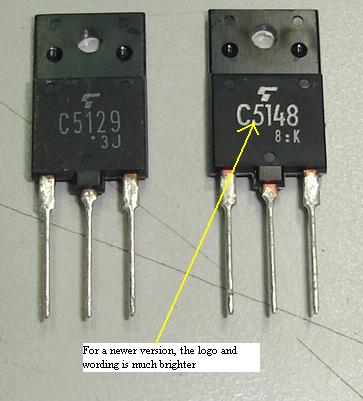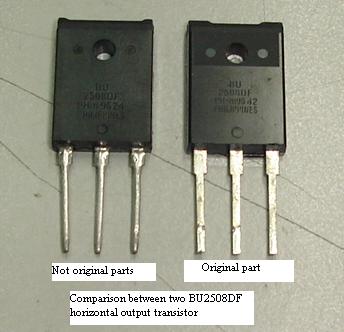Understanding The High Voltage Transistor Secrets
High voltage transistors are transistors with higher specification than the normal transistor. It is usually located in the area of power transformer such as the switch mode power transformer and flyback transformer. In television and monitor that uses the flyback transformer to generate high voltage, a high voltage transistor is required to perform the job. It's location mainly beside the flyback transformer and attach to a heat sink in order to transfer heat faster. Otherwise it may blow in a very short time due to the hard work of this transistor in switching.
If this high voltage transistor is shorted, you have to find the exact replacement part number in order for the equipment to last longer. Substitution part number usually won’t last long-perhaps in the few weeks or few months time and it will blow again unless you know the storage and the fall time of the transistor. Higher voltage, ampere and wattage will not guarantee that your transistor will last long. Many times a bigger specification will blow in a split of seconds the moment you switch on the equipment. You have to go to that particular manufacturer to get the transistor datasheet and find out the spec of the transistor. Look for the fall time and storage time value. The original and the replacement value should have tolerance of not more than 20%. If not the replacement transistor will run hot and eventually blow the transistor. This will waste your precious time. As to why sometimes even the nearest specification transistor also won't work well is because the particular equipment such as monitor-the yoke coil and the flyback transformer is designed based on the specification of the transistor. Thus, only original part number transistor that can be install in that particular equipment.
Even replacing the flyback transformer also won’t help. The transistor's temperature keeps rising and if I don't turn off the monitor, I believe it will eventually blow the transistor. I took out the transistor and compared with the original one and discovered that the replacement logo is a little bit different from the original transistor logo. When I called my electronic supplier about the logo, they said that the transistor that I bought is of a newer version, thought from the same factory. After long hour of searching for the original transistor, I managed to find one. Unbelievable, the original transistor that i replaced runs cool and the picture is perfectly fine. Guess what is the high voltage transistor part number? It was C5148! In another case, there was one Monitor came in with no power symptom. Upon carefully check the high voltage area; I confirmed that only HOT shorted causing no power. After the replacement (the part number was BU2508DF), when the monitor is switch on, the power blink. I thought that there was some other bad components are causing the power to blink. I check again the power and high voltage section but just could not locate the fault. I took out the HOT that I had just replaced and realize that it was a little bit different from the original one. I took out another HOT that is exactly the same from my spare parts compartment and voila the monitor works perfectly okay. I begin to compare both HOT and you can clearly see the different from the picture shown below.
The lesson that I learned from this mistake is that one should always replace the HOT or high voltage transistor with an original part number (if possible) and don’t buy any components that is cheaper than the normal market price.
|
|
Copyright@ 2006-2014-www.ElectronicRepairGuide.com All Rights Reserved
 Typical part number of high voltage transistor that used in monitor and TV is BU2508DF, C3998, C5148, C5047, C5589, C5803 and
etc. Usually their rating of volt, amp and watt is in the 1500 volt and above, 10 amps, 50 watt and more. Their sizes are much bigger than
the common signal transistor.
Typical part number of high voltage transistor that used in monitor and TV is BU2508DF, C3998, C5148, C5047, C5589, C5803 and
etc. Usually their rating of volt, amp and watt is in the 1500 volt and above, 10 amps, 50 watt and more. Their sizes are much bigger than
the common signal transistor.
 I have seen even the original number with different batch of transistor when install in the monitor causing the display to curve
in (pincushion out) and the transistor runs very hot. I've checked all the circuit and components that connected to the transistor to be
okay.
I have seen even the original number with different batch of transistor when install in the monitor causing the display to curve
in (pincushion out) and the transistor runs very hot. I've checked all the circuit and components that connected to the transistor to be
okay.